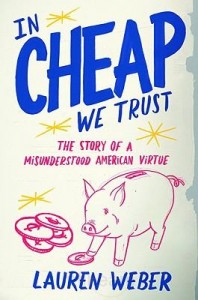 Although I’ve had Lauren Weber’s In Cheap we Trust: The Story of a Misunderstood American Virtue from the library for a week or so, I only just cracked it open today. And in a world where it will often take a chapter or two to decide whether is book is right for me, this one had me at the dedication:
Although I’ve had Lauren Weber’s In Cheap we Trust: The Story of a Misunderstood American Virtue from the library for a week or so, I only just cracked it open today. And in a world where it will often take a chapter or two to decide whether is book is right for me, this one had me at the dedication:
“For my father, a cheap and generous man.”
It may seem odd to review a book I’m only 12 pages into, but I am absolutely loving this book, which is a mixture of memoir and a serious look at America’s history of thrift.
Weber grew up with a father whose “cheapness” was legendary in her family. A man, whose advice to child living in a New England house where the thermostat was set at 50° was to “put on another sweater.” Not “put on a sweater,” but “another sweater.” But the goal of Weber’s father’s extreme frugality was not to stockpile untouchable piles of riches, but instead was to provide top notch educations for his children and made it possible for him to pay out of pocket for her grandmother’s assisted living facility.
The long understood notion that America is a country proudly based on a tradition of thrift is challenged:
“For one thing, I’m not fully convinced that ordinary Americans ever truly valued thrift in the first place. When I started researching the history of frugality, I assumed, as most Americans probably do, that we were once a thrifty nation but we had become lazy and spoiled over time, a condition abetted by a cabal of corporations and advertising firms. I began this book with a single question in my mind: What happened to thrift in America? But as I got deeper in the subject I came to realize that we consider old-fashioned thrift — some combination of resourcefulness, prudence, simplicity and aversion to debt — was more the result of circumstance than virtue. Thrift was determined by necessity in the early days of the republic. Goods were scarce and often prohibitively expensive for the average family, so stockings were darned, clothes were patched, fruits were preserved and stored. People made do with what they had until the stuff fell apart or was used up. Very little went to waste when each cord of firewood or linen nightshirt was the product of one’s own labor.
But when industrialization and financial innovation brought Americans opportunities to make their lives easier and more comfortable — through new technologies like railroads and refrigerators, and the emergence of installment plans, mail-order shopping and credit cards — by and large they took advantage of them. Indeed the truest story of America is not, as we might like to believe, the story of political freedom — slavery and the Japanese internment of World War II, for instance put the lie to that — but the story of an ever rising standard of living.”
Well, you can see why this book has hooked me.
I will continue to read through this book and envision a number of blog posts about ideas put forth in it.
Weber writes of her “cheap” father with love and humor, and I can’t wait to delve even farther into this book. After all, she may have dedicated it to her Dad, but secretly I think she may have written it for me.
Katy Wolk-Stanley
“Use it up, wear it out, make it do or do without.”



{ 15 comments… read them below or add one }
Thanks for the info about the book Katy – my local library has it and I’ve put it on hold! I live in Canada, but our thrifty (or lack thereof) history is quite similar, so I’m sure I will enjoy the book as well.
I’ll take your reccomendation. I just placed it on my reading list at my local library. Ours makes it easy. There are online searches, and requests. They will pull the book and have it at my local branch, and all done from my comfy computer chair.
And most importantly… I won’t have to spend a dime to read the book.
That book looks awesome! I’m definitely adding it to my list. Have you read Waste and Want: a Social History of Trash by Susan Strasser? In Cheap We Trust reminds me of it, although Strasser does champion the thrift of earlier days, if I remember correctly. Weber’s new take on it sounds right on!
I just finished scarfing down “These Is My Words,” an absolutely engrossing novel about a female[1] in late 19th C Arizona “outback.” I lost FOUR HOURS of sleep because I couldn’t put it down. It’ll take a while for the next one to wend its way into my hand so I’ll give your book a try.
BTW, I’m not surprised at all that thrift was from necessity and was discarded when no longer necessary. Being frugal is a pain in the tush – why do it if you don’t have to?
[1] The book spans 20 years so she goes from girl to woman.
Leah,
I had not heard of that book, but I now have it on hold at the library. Thanks!
Katy Wolk-Stanley
The Non-Consumer Advocate
I enjoyed this book as well, what I was able to read of it before Christmas baking started. I’ll borrow it again and finally finish it soon!
Funny, my copy just arrived at the library yesterday and I can’t wait to read it! The above paragraph makes me think of my once-thrifty mother in law. As a widow raising 3 kids on a teachers salary, she squeezed the nickles until, well, you know, lol. But as a retired person, an Austrian who spent her childhood in bomb shelters, who now finds herself with means, well let’s just say the grandkids get too many toys for christmas and this year she got me a quesadilla maker. She thinks my frugality is a burden upon my family, but I try to make light of it.
Katy,
You convinced me to pick it up. I saw it while browsing the list of new books at my library’s website. It didn’t sound like it would be all that entertaining, but it may be what I need to jump start my own thrifty habits.
Reading about “thrift” reminded me of a local savings and loan back when I was growing up called Cumberland Thrift. Now, isn’t that a great name for a bank? Back then, banks were places to having savings accounts instead of places you go to get loans. The comparison is pretty stark – thrift is a word (verb) we should all consider.
Katy,
did you really misspell “education”? lol. must be the last of your cold.
Marianne,
Oops.
I can’t wait to read this book ! Sounds like Lauren Weber’s father was a true champion. The fact that he was a loving father must have made his cheapness a lot more tolerable.
i just started this book last night!
Katy I had not heard of this book but can’t wait to pick it up at the library.
I can not wait to start this book after I finish “Not Buying It.”